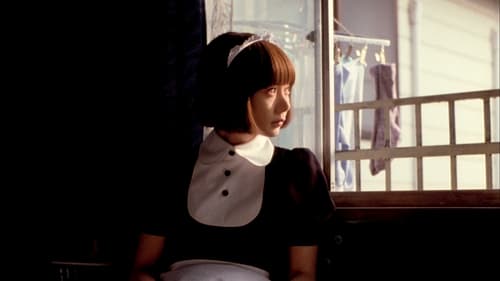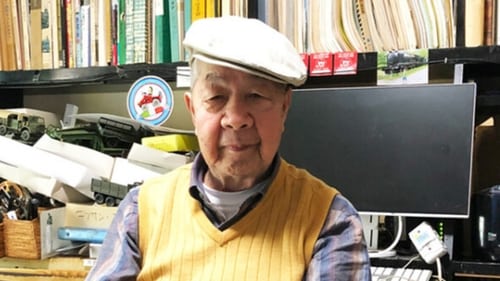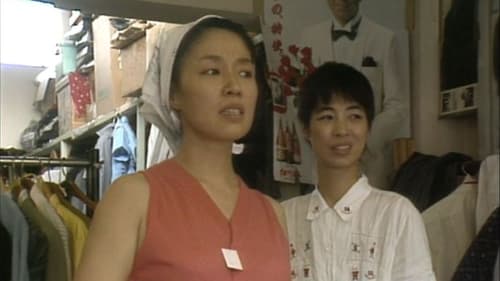
Producer
Una muñeca hinchable de tamaño natural vive en un modesto piso de Tokio. Es la única compañía de su solitario amo, un hombre de mediana edad. Él le habla, la baña y le hace el amor cada día cuando vuelve del trabajo. Sin embargo, esta rutina se rompe cuando, de repente, la Muñeca Hinchable cobra vida y con ella un alma. Acaba de nacer y no entiende lo que ocurre a su alrededor, aunque se da cuenta de que existe otro mundo más allá de las paredes del piso. Cuando, por fin, se atreve a salir al mundo exterior, se siente fascinada por todo lo que ve. Conoce a mucha gente, pero nadie es capaz de explicarle qué significa "estar viva". Un día, entra en un videoclub y conoce a Junichi, el vendedor, del que se enamora inmediatamente...

Producer
Yasuo Ōtsuka was the mentor of Isao Takahata and Hayao Miyazaki, the man who taught them to feel the joy of animation. As the supervising animator of their films and through the creation of superb scenes such as Lupin leaping from turret to turret in Lupin the 3rd: The Castle of Cagliostro, Ōtsuka made the impossible believable, and touched people’s emotions. To look back at the many works he was involved in is to review the history of Japanese animation after WWII. This film is a must for anime fans who want to learn how Japanese animation evolved.

Screenplay
Yasuo Ōtsuka was the mentor of Isao Takahata and Hayao Miyazaki, the man who taught them to feel the joy of animation. As the supervising animator of their films and through the creation of superb scenes such as Lupin leaping from turret to turret in Lupin the 3rd: The Castle of Cagliostro, Ōtsuka made the impossible believable, and touched people’s emotions. To look back at the many works he was involved in is to review the history of Japanese animation after WWII. This film is a must for anime fans who want to learn how Japanese animation evolved.

Director
Yasuo Ōtsuka was the mentor of Isao Takahata and Hayao Miyazaki, the man who taught them to feel the joy of animation. As the supervising animator of their films and through the creation of superb scenes such as Lupin leaping from turret to turret in Lupin the 3rd: The Castle of Cagliostro, Ōtsuka made the impossible believable, and touched people’s emotions. To look back at the many works he was involved in is to review the history of Japanese animation after WWII. This film is a must for anime fans who want to learn how Japanese animation evolved.

Writer
Prolific director Kinji Fukasaku died suddenly during the production of Battle Royale 2. His son and screenwriter Kenta took over as director and completed the film.

Producer
Prolific director Kinji Fukasaku died suddenly during the production of Battle Royale 2. His son and screenwriter Kenta took over as director and completed the film.

Director
Prolific director Kinji Fukasaku died suddenly during the production of Battle Royale 2. His son and screenwriter Kenta took over as director and completed the film.

Writer
The late Kinji Fukasaku directed "Battle Royale" - his 60th movie - at the age of 70. This film follows the shooting of the film.

Producer
The late Kinji Fukasaku directed "Battle Royale" - his 60th movie - at the age of 70. This film follows the shooting of the film.

Director
The late Kinji Fukasaku directed "Battle Royale" - his 60th movie - at the age of 70. This film follows the shooting of the film.

Producer
Mononoke Hime wa koushite umareta, also known as The Making of "Princess Mononoke", is a three-tape VHS video boxed set (total length 6 hours 40 minutes) released in Japan at the end of 1997. Re-released on DVD

Director
Mononoke Hime wa koushite umareta, also known as The Making of "Princess Mononoke", is a three-tape VHS video boxed set (total length 6 hours 40 minutes) released in Japan at the end of 1997. Re-released on DVD

Director
Part 1 of Mononoke Hime wa koushite umareta, also known as The Making of "Princess Mononoke", an exhaustive three-part making of documentary of Hayao Miyazaki's Princess Mononoke

Director
Part 3 of Mononoke Hime wa koushite umareta, also known as The Making of "Princess Mononoke", an exhaustive three-part making of documentary of Hayao Miyazaki's Princess Mononoke

Director
Part 2 of Mononoke Hime wa koushite umareta, also known as The Making of "Princess Mononoke", an exhaustive three-part making of documentary of Hayao Miyazaki's Princess Mononoke

Producer
Making of Daibyonin, directed by Juzo Itami, also known as "The Last Dance"

Director
Making of Daibyonin, directed by Juzo Itami, also known as "The Last Dance"

Producer

Producer

Producer

Writer

Producer
Documentary about the making of Juzo Itami's film "Tampopo" (1985).

Writer
Documentary about the making of Juzo Itami's film "Tampopo" (1985).

Director
Documentary about the making of Juzo Itami's film "Tampopo" (1985).














